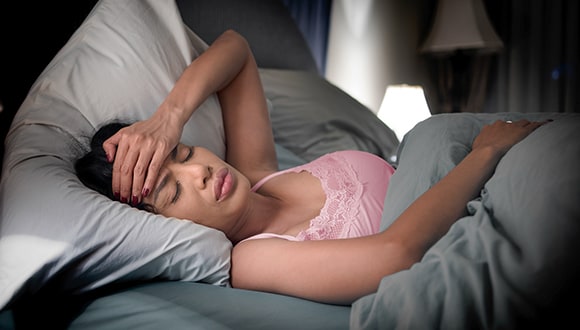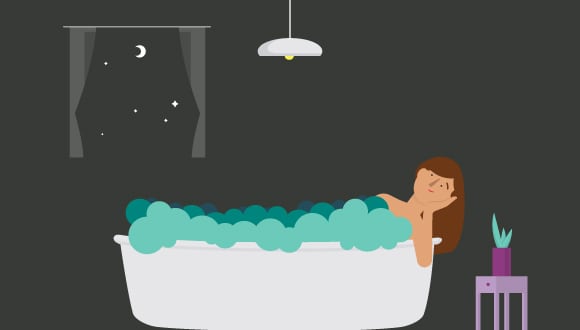Insomnia before your period: sleep and the menstrual cycle
Published March 2024 | 6 min read
Expert contributor Dr Carmel Harrington, sleep scientist
Words by Beth Wallace
Did you know the phases of the menstrual cycle can have a huge impact on your sleep? Find out how to manage the hormonal changes and get more quality shut-eye.
Alongside bloating, acne and weight gain, poor-quality sleep is linked to pre-menstrual syndrome (PMS), with many women experiencing sleep problems or insomnia with PMS, as well as general fatigue and mood swings during menstruation.

According to the Sleep Health Foundation, up to seven in 10 women say their sleep changes in the days leading up to their period, typically three to six days before bleeding starts.
Complicating the situation is that these changes may also be a result of sleep deprivation, says Dr Carmel Harrington, sleep scientist and author of The Sleep Diet and The Complete Guide to a Good Night's Sleep. "The symptoms of sleep deprivation, such as anxiety, a foggy brain, mood disturbance and poor concentration, are very similar to the symptoms of pre-menstrual syndrome," she explains.
Given that chronic sleep deprivation can negatively impact your mental health, increase your risk of weight gain and diabetes, and compromise your immune health, Dr Harrington says you should seek medical advice if you’re concerned about the quality of your sleep.
"Some people have pre-menstrual syndrome, which is hormone-related, so they need to be assessed by a GP," she says. "But others could start looking at what's happening with their sleep and find ways to improve it."
Understanding the phases of the menstrual cycle
Each of the different stages of the menstrual cycle is associated with specific hormonal fluctuations.
- The follicular phase is when the ovaries produce oestrogen, stimulating the growth of follicles that contain developing eggs.
- Then comes ovulation, when a mature egg is released from an ovary and moves towards the uterus.
- Next comes the luteal phase, which is accompanied by increased levels of progesterone as the uterus prepares for a possible pregnancy.
- Finally, if conception does not occur, menstruation (bleeding) begins as your uterus sheds its lining – and then the cycle starts again.
Dr Harrington says the oestrogen produced during the first phase of your menstrual cycle supports better quality sleep, which is why you may typically feel fine and well rested at this time. On the flipside, a rise in levels of the soporific hormone progesterone (known as the 'relaxing hormone') during the luteal phase of the cycle can increase feelings of sleepiness. "In the second half of our cycle, compared to the first half, we can have an increased need for sleep," she says.
During this part of your menstrual cycle, you may also experience an increase in body temperature by around 0.3 to 0.7°C. "That doesn't sound like much," says Dr Harrington, "but because our body likes to fall asleep on a decrease in temperature, even this small increase blunts the message that it's time to fall asleep."
Another challenge at this point in your cycle is that you may have low levels of melatonin – the hormone responsible for regulating your body’s circadian rhythm. "When we see dim or dark light, we start to produce melatonin, then about an hour to an hour-and-a-half later, we're ready to go to sleep," says Dr Harrington. "But when sensitivity to melatonin decreases, again, it's not as good an indicator that it’s time to go to sleep."
The combination of these factors mean that you can become increasingly sleep deprived during the pre-menstrual phase of your cycle, even if you’re getting your regular quota of sleep.
How to navigate menstruation and insomnia
What exactly does 'good' sleep look like? According to the US National Library of Medicine, a good night’s sleep involves falling asleep easily, not fully waking up during the night, not waking up too early and feeling refreshed in the morning.
If this doesn't sound like the kind of sleep you're getting, Dr Harrington recommends keeping a sleep diary for a few months. "That way, you can see whether your pre-menstrual symptoms are related to sleep deprivation and maybe that you need to start increasing your sleep time and making sure you have really good sleep practices," she says.
Healthy sleep practices include taking a warm shower or bath an hour or two before bed, which research shows improves sleep and helps you fall asleep more easily.
Getting up at the same time every day can also be beneficial, with Dr Harrington explaining that when we wake up and expose ourselves to light, we’re setting our biological clock for the next 24 hours. "We'll be ready to go back to sleep, as healthy adults, about 16 hours later. So if you get up at 6am, you're ready to go back to sleep at 10pm."
Exercise also supports good sleep, with one study showing that when teenagers are more physically active than usual, they fall asleep earlier and sleep longer – and better – at night.
Likewise, you should aim to create an environment that’s conducive to sleep. This includes having a room temperature of 17 to 19°C and dim lighting, as well as not using electronic devices in the two hours before bed, as they can cause decreases in sleep duration and quality.

In the week before your period, Dr Harrington also suggests bringing your bedtime forward, especially if you're feeling tired. "If you’re pushed for time, maybe don’t exercise as much that week," she adds.
She points to the experience of a 17-year-old patient, who implemented a variety of these sleep practices to manage an anxiety condition that was peaking during the pre-menstrual phase of her cycle.
Working alongside her patient's GP, who had already prescribed anti-anxiety medication, Dr Harrington encouraged the teenager to start keeping a sleep diary. "We saw that her symptoms were exacerbated in the second half of her cycle," she explains. "We started implementing good sleep practices: an earlier go-to-bed time, a hot shower before bedtime and enhancing the dimness of light around her at night.
"As a result, she started to sleep more in the second half of her cycle and the symptoms of her anxiety weren’t as pronounced."
Are you getting enough sleep?
Thanks to her patient's sleep journal, Dr Harrington was able to identify the link between reduced sleep quality and PMS. She also discovered that the teenager hadn’t been getting enough sleep even when she wasn’t pre-menstrual.
While healthy adults (aged 18 to 64) require seven to nine hours’ sleep each night, teenagers aged 14 to 17 require somewhere between eight and 10 hours.
Many of us tend to let sleep fall by the wayside when life gets busy, but Dr Harrington says we need to prioritise sleep in the same way we do with exercise and nutrition. If you're experiencing persistent sleep problems, make an appointment to talk to your GP.
"We have to start recognising that it is the triumvirate – nutrition, exercise and sleep – that will give us overall health," says Dr Harrington.
Build better sleep habits
Is your menstrual cycle impacting your sleep? Thanks to our partnership with Sleepfit Solutions, eligible HCF members* can get a free 12-month subscription to the Sleepfit app, designed to improve sleep and overall wellbeing.
related articles
Tips to treat insomnia
Women are more likely to experience insomnia than men, due to hormones and higher rates of anxiety and depression. Struggling to sleep? Try these tips.
How to fit in more exercise
Carving out time to hit the recommended daily amount of exercise doesn’t have to be challenging. Here’s how to fit five hours of exercise into your busy week.
7 effects of sleep deprivation
Not getting enough shut-eye can be harmful to your health. Here are seven effects of sleep deprivation – and some strategies to help you fix it.
Endometriosis versus PCOS
The symptoms of endometriosis and polycystic ovary syndrome (PCOS) often overlap – both can impact your period and fertility. Here’s how to tell the difference.
IMPORTANT INFORMATION
* Eligibility criteria apply. See hcf.com.au/sleepfit for details.
This communication contains information which is copyright to The Hospitals Contribution Fund of Australia Limited (HCF). It should not be copied, disclosed or distributed without the authority of HCF. Except as required by law, HCF does not represent, warrant and/or guarantee that this communication is free from errors, virus, interception or interference. All reasonable efforts have been taken to ensure the accuracy of material contained on this website. It’s not intended that this website be comprehensive or render advice. HCF members should rely on authoritative advice they seek from qualified practitioners in the health and medical fields as the information provided on this website is general information only and may not be suitable to individual circumstances or health needs. Please check with your health professional before making any dietary, medical or other health decisions as a result of reading this website.